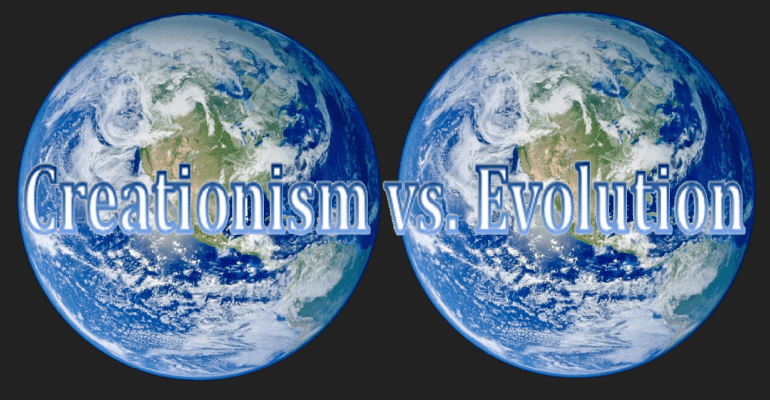
There seems to be a kerfuffle claiming that Superintendent of Public Instruction Diane Douglas wants to eliminate (or downplay) teaching the Theory of Evolution and substitute “intelligent design” or Creationism as part of the school curriculum.
See the claim from the Arizona Daily Star: Arizona’s schools chief seeks limits on teaching evolution, Big Bang theory (link to story).
And a rebuttal from ADI’s Loretta Hunnicutt: Fake News Claims Evolution Stripped Out Of Arizona Science Standards (link to story).
Before getting to the philosophy, I have some (tongue-in-cheek) questions for hard-core “intelligent design” folks:
1) Why do human males have nipples? How intelligent is that?
2) What if some entity figuratively snapped its fingers and precipitated a “big bang” that created a universe with the precise chemical and physical properties that led to evolution of life. That’s the ultimate “intelligent design.”
3) Is God a tinkerer? The Genesis story of creation contains this phrase several times: “And God saw that it was good.” Didn’t He know it would be good beforehand, or was He experimenting and evolving?
The philosophy of religion and secularism:
Do you know the difference between right and wrong? How do you know? Upon what principles do you base your judgment? In this age of politically-correct, moral relativism, many of us think that many others don’t know the difference, or, at the very least, are operating on a different system of moral justification. Does the end justify the means, and is the end itself justifiable? Let’s review, very briefly, the theories of what is right.
There are four general theories used to justify the rules for civil society, one religious and three secular.
All religions, aside from their various creeds and rituals, have two common characteristics. They attempt to explain the origin of the world and man, and they attempt to provide justification for a system of ethics and social mores. The first characteristic has provided many interesting stories; the second has often led to trouble and intolerance. Religious doctrine has been used to justify the “divine right of kings” and to support systems which give little respect to or cognizance of individual rights.
The first of the secular systems, Natural Law theory, supposes that there are certain principles “discovered,” not “invented” by all societies, practical principles which work. In Western civilization, these principles derive from Greek and Roman law; especially the latter, since the Romans had to adjudicate cases in many cultures, and they noticed that disparate societies had some principles in common. Our founding fathers embraced Natural Law theory in the Declaration of Independence, when they wrote: “We hold these truths to be self-evident, that all men are created equal, that they are endowed by their Creator with certain unalienable rights ….” Natural Law confers rights to the individual, and individuals form a society with a social contract based on those rights.
Natural Law theory has always had two problems, however. How can you identify a “natural” law? And, how do you make it work in society? The observations of the Romans answered the first: find the common principles which work in a variety of cultures. Our founding fathers found a solution to the second: the U.S. Constitution.
The second secular system, called the “Organic Theory” or “Historicism,” was a rejection of natural law. It was a reaction among European thinkers who thought that events such as the French revolution and breakdown of monarchies were getting too messy. Organic theory attempted to find a unifying doctrine that could conform all of society to some static model of perfection. This theory sought to identify a “collective will” manifested by majority rule, but it essentially ignored individual rights. Organic theory evolved into National Socialism in Germany, and into Communism.
The third secular theory is Utilitarianism. This, too, is a product of 18th century Europe and a rejection of natural law. Utilitarians think they can design a system of government to maximize the happiness of the citizens based on scientifically determined principles of governance. They attempt to show how a citizen’s self-interest can be reconciled with social responsibility without resorting to any lofty metaphysical assumptions. To reach this happy state, Utilitarians are loath to compare the values of one person with another. They think that goals, and means toward those goals, are so obvious to the enlightened, that they need not be justified with actual evidence. This theory has led to welfare economics and moral relativism.
Our educational system should visit all of these views and let the students decide for themselves which makes the most sense.
Finally, evolution is a scientific concept but science is not set in stone because:
“Any physical theory is always provisional, in the sense that it is only a hypothesis: you can never prove it. No matter how many times the results of experiments agree with some theory, you can never be sure that the next time the result will not contradict the theory. On the other hand, you can disprove a theory by finding even a single observation that disagrees with the predictions of the theory.” –Stephen Hawking
Note to readers:
- Index with links to all my ADI articles: http://wp.me/P3SUNp-1pi
- My (newly updated) comprehensive 30-page essay on climate change: http://wp.me/P3SUNp-1bq
- A shorter ADI version is at https://arizonadailyindependent.com/2013/08/01/climate-change-in-perspective/
If you like murder mysteries, type the name Lonni Lees (my wife) into Amazon or Barnes & Noble sites to see her novels, a book of short stories, and reviews. For synopses and more reviews of her books see: https://wryheat.wordpress.com/lonnis-murder-mysteries/
